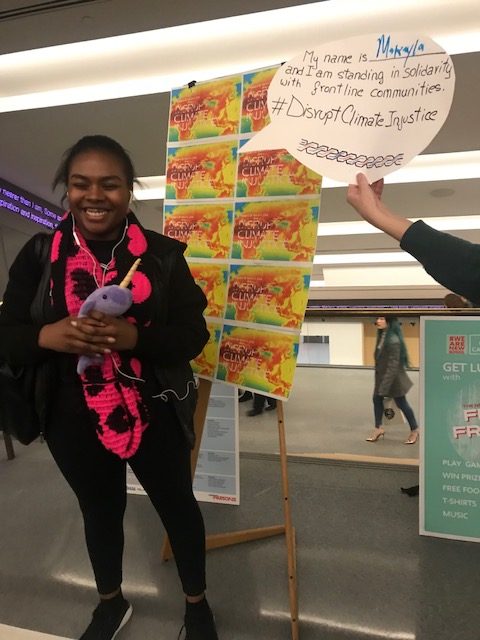Occupying The University Center to Disrupt Climate Injustice
By Amanda Sachs
Tuesday February 27th, as part of The New School's "Disrupt Climate Injustice" curriculum disruption, students in the Sustainability Perspectives and Practice course charged the University Center Lobby with information about climate change, climate injustice, and people power. Professor Ana Baptista’s Sustainability Perspectives and Practice course takes a guided approach to environmental practice that broadens students’ views through multiple environmental perspectives, while focusing on complex systems. The issue of climate change is not so simple as to require one single area of human behavior to change; climate change is a symptom of unsustainable and exploitative practices in practically every arena of economies (i.e. energy, agriculture, transportation, land-use, waste, etc).The energy around climate change in the University Center disrupted the days of students and faculty for a few moments to remind them of the planet’s changing and its unequal social impacts. The students greeted those entering the University Center excitedly, directing them to take a climate quiz, learn more about climate injustice, or take the Tishman Center Sustainability Pledge. Easels were set up for students to jot down responses to “what are you most afraid to lose to climate change” and “what can you do for your planet?” There are moments in which even the most aware American believes that climate change won’t affect their life or it won’t be as bad as scientists are saying. It’s also typical for people to shut down mentally when confronted by the daunting task. The climate disruption exercise in the University Center was an attempt to remind people about climate change while asking them to be a part of the solution and to not shut down over it. Students in the Sustainability Perspectives and Practice course engaged in conversation on climate injustice with students and faculty passing by. Many of the passersby knew about climate change but underestimated its severity on the climate quiz. They were shocked to learn the shear number of people displaced by extreme weather events or the percentage of communities of color living within a half mile of toxic waste sites in the United States.Whether bringing awareness to daily practices which have impacts on people and the planet (waste, plastic, energy usage, etc.), or introducing students and faculty to the emerging climate justice movement, in the end, a fun learning experience was achieved.
Amanda Sachs is a graduate student in the Environmental Policy and Sustainability Management Program at The Milano School. She spends her time pondering pathways for equitable and high-impact climate change mitigation/adaptation strategies. She works as an environmental justice research assistant at The New School.



